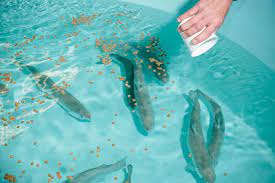
Fishery Sciences
Fisheries Sciences
Introduction
Fisheries, as the name suggests is an organized effort which is related to the capturing of fish including inland and sea or other aquatic species. This industry involves catching, processing, marketing and conservation of fish. Fisheries Science is an academic discipline of managing and understanding fisheries. This is a multidisciplinary subject that includes the biological study of life, habits and breeding of various species of fish. It also involves farming and husbandry of important fishes and aquatic organisms in fresh water, brackish water and any marine environment.
Skill Set
- Curiosity and interest in marine life
- Patience and orientation towards doing research
- Able to take quick and spontaneous decisions
- Good managerial and team working skills.
- Research oriented mentality
- Dedication to work
- Inquisitive mind
Eligibility
Candidate must have passed 10+2 in Science stream with subjects such as Physics, Chemistry and Biology from a recognized college or university.
Top Colleges
Indian Council of Agricultural Research (ICAR)- AIEEA
All India Entrance Examination for Admission (AIEEA)-UG shall be conducted for admission to Bachelor Degree programmes in Agriculture and allied sciences (other than veterinary sciences), at Agricultural Universities on 15% of the University seats (100% seats in RLB CAU Jhansi, NDRI Karnal and Dr. RP CAU Pusa, Bihar)
Eligibility: 10+2 examination or equivalent/Inter (Agriculture) with PCM/ PCB/ PCMB/ PCA/ PCH subject combinations with 50% marks in aggregate
Question Paper for AIEEA-UG:
- There will be only one question paper consisting of 180 multiple-choice objective type questions-
- Physics, Chemistry and Biology (or Agriculture) for “STREAM– A”
- Physics, Chemistry and Mathematics for “STREAM–B”.
- The question paper will be in ENGLISH and HINDI.
- For each incorrect answer, one mark will be deducted from the total score.
Syllabus
Desh Bhagat University : School of Agriculture, Gobindgarh
Course: B.Sc. Fisheries
Eligibility: 10+2 or equivalent (minimum 45% Marks) with Chemistry, Physics, English, Agri/Biology, Mathematics.
Admission Mode: Admission is based on the marks obtained in 10+2.
Maharashtra Animal & Fishery Sciences University, Nagpur
Course: Bachelor of Fisheries Science (B.FSc.)
Eligibility: XII passed with PCBE
Admission Mode: Merit Based
Guru Angad Dev Veterinary and Animal Sciences University, Ludhiana
Course: Bachelor of Fisheries Science
Eligibility: Candidate should have a minimum qualification of 10+2 with Physics, Chemistry, Mathematics or Biology and English from a recognized Indian Board/ University with at least 50% marks in aggregate
Selection Process: Admission will be done on Merit basis
Chhattisgarh Kamdhenu University, Chhattisgarh
Course: Bachelor of Fisheries Science
Eligibility: Candidate should have passed 10+2 with minimum 50% aggregate of PCB
Selection Process: NEET and/ or ‘AIEEA-UG’ conducted by ICAR
Exam Pattern
- Physics
- Chemistry
- Biology
College of fisheries, Mangalore
Course: B.F.S.C. (Bachelor of fisheries science)
Eligibility: Candidate should have passed 10+2 with Physics, Chemistry, Mathematics and biology as elective subjects
Selection Process: Admission will be done strictly on Merit basis
Job Areas
- Assistant Fisheries Development Officer
- Fisheries Extension Officer (FEO)
- District Fisheries Development Officer
- Marine Products Export Development Authority (MPEDA)
- Fisheries survey of India
- Commercial fish farming
- Aquaculture farms
Disclaimer: The information provided here is to the best of our knowledge. It is highly recommended that you cross check the source of information through the specific Colleges and Universities. Career Prabhu is in no way responsible for the decisions made solely on the basis of this document
